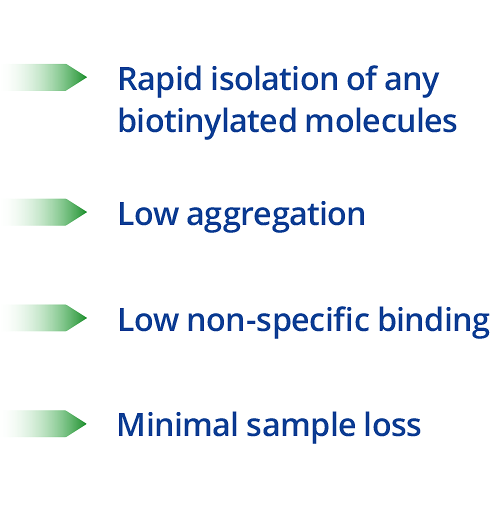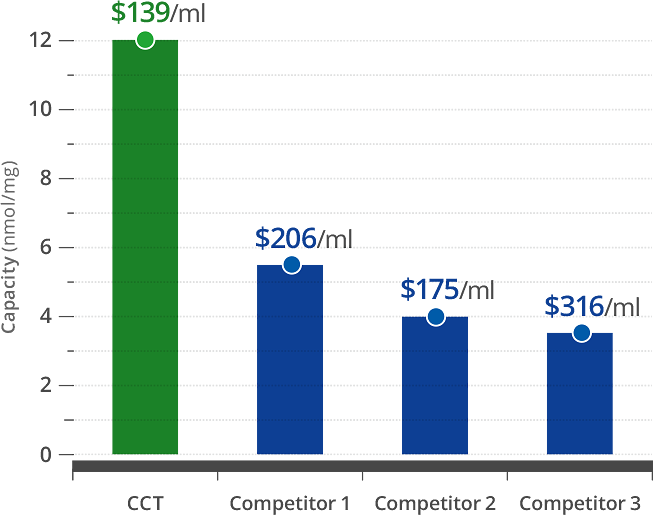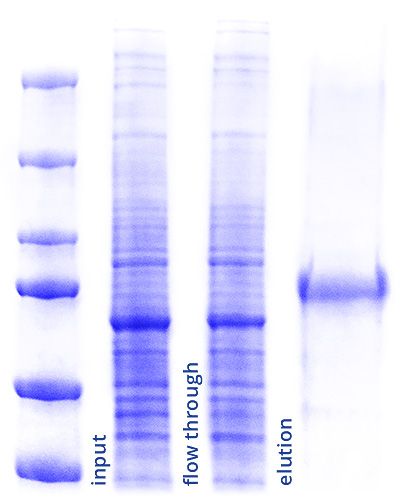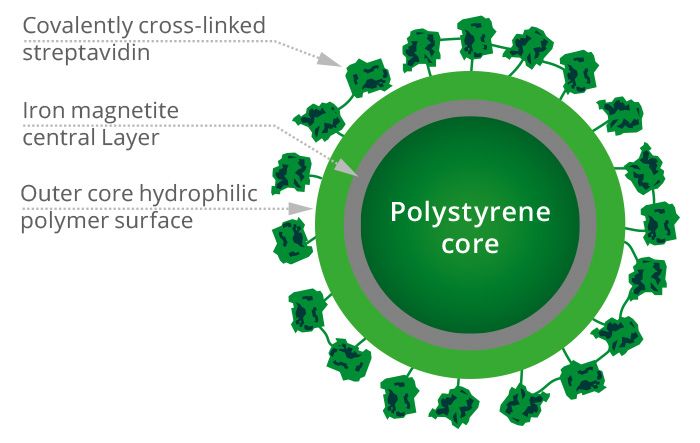High Capacity Streptavidin Magnetic Beads
Click Chemistry Tools manufactures Streptavidin Magnetic Beads with one of the highest biotin binding capacities on the market (>12 nmol of biotin per mg). Higher binding translates into reduced bead mass required to immobilize a biotinylated sample and lower background noise from nonspecific binding, resulting in better signals and lower net costs. The beads are 1.0 μm in diameter and bind at least 12 nmol of free biotin per milligram of beads. The beads also have excellent magnetic properties for rapid and efficient capture using a variety of magnetic stands.
Enrichment target:biotinylated molecules
Activation level (free biotin per milligram of beads):≥ 12 nmol /mg
Activation level (biotinylated IgG per milligram of beads):≥ 110 μg/mg
Support:Highly uniformed supermagnetic particles
Coating:Highly crosslinked, proprietary (non-styrene) polymer matrix
Mean bead diameter:0.8 μm
Formulation:10 mg/mL suspension in water
Preservative:0.05% sodium azide
Appearance:Brown suspension
Storage:2-8℃
Shipping conditions:Ambient temperature
Comparison of Streptavidin Magnetic Beads Performance binding capacity versus competitors



Additional points:
Binding capacity: ≥ 12 nmol/mg of free biotin per mg of beads and ≥ 110 μg/mg of biotinylated IgG per mg of beads.
Excellent for fast and direct isolation of any biotinylated molecules, such as nucleic acids (both DNA and RNA), oligonucleotides, proteins, peptides, and antibodies.
Easily adapted for manual and automated high-throughput applications.
High batch-to-batch reproducibility.
30 μg of BSA-biotin in HEK 293T RIPA lysate was mixed with 1 mg of High Capacity Streptavidin Magnetic Beads. Eluted with 1x Laemmli Sample Buffer, 10 minutes at 95 C. Mass shift – conjugate of BSA-biotin and one subunit of Streptavidin.

Abs/Em Maxima: 346/445 nmExtinction Coefficient: 19,000Spectrally Similar Dyes: Alexa Fluor? 350, CF? 350, DyLight 350, AMCAAZDye? 350 is a blue-fluorescent azide-activated probe that reacts with terminal alkynes via a copper-catalyzed click react…
Abs/Em Maxima: 402/424 nmExtinction Coefficient: 35,000Flow Cytometry Laser Line: 405 nmMicroscopy Laser Line: 405 nmSpectrally Similar Dyes: Alexa Fluor? 405, CF? 405, Cascade Blue?, DyLight? 405AZDye? 405 Azide is a water-soluble, pH-insensiti…
Abs/Em Maxima: 346/445 nmExtinction Coefficient: 19,000Spectrally Similar Dyes: Alexa Fluor? 350, CF? 350, DyLight 350, AMCAAZDye? 350 Alkyne (Alexa Fluor? 350 Alkyne equivalent) is a blue-fluorescent, alkyne-activated probe that reacts with azid…
Abs/Em Maxima: 430/537 nmExtinction Coefficient: 15,000Spectrally Similar Dyes: Alexa Fluor? 430, CF? 430AZDye? 430 Azide is a water-soluble, green-fluorescent azide-activated probe that reacts with terminal alkynes via a copper-catalyzed click re…
Abs/Em Maxima: 346/445 nmExtinction Coefficient: 19,000Spectrally Similar Dyes: Alexa Fluor? 350, CF? 350, DyLight 350, AMCAAZDye? 350 DBCO reacts with azides via a copper-free “click chemistry” reaction to form a stable triazole and does not re…
Abs/Em Maxima: 402/424 nmExtinction Coefficient: 35,000Flow Cytometry Laser Line: 405 nmMicroscopy Laser Line: 405 nmSpectrally Similar Dyes: Alexa Fluor? 405, CF? 405, Cascade Blue?, DyLight? 405AZDye? 405 Alkyne reacts with azides via a copper…
Abs/Em Maxima: 494/517 nmExtinction Coefficient: 73.000Flow Cytometry Laser Line: 488 nmMicroscopy Laser Line: 488 nmSpectrally Similar Dyes: Fluorescein, Alexa Fluor? 488, CF? 488A, DyLight? 488, Atto? 488AZDye? 488 Azide (Alexa Fluor? 488 Azi…
Abs/Em Maxima: 402/424 nmExtinction Coefficient: 35,000Flow Cytometry Laser Line: 405 nmMicroscopy Laser Line: 405 nmSpectrally Similar Dyes: Alexa Fluor? 405, CF? 405, Cascade Blue?, DyLight? 405ZDye? 405 DBCO reacts with azides via a copper-fr…
